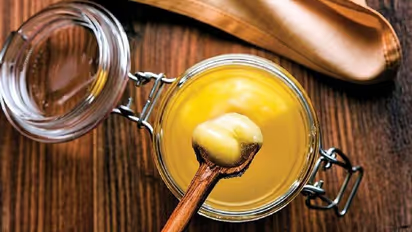Food myths busted: Is desi ghee unhealthy?
The popular food myths are, well, untrue. Today, we list out India's most popular food myths, find out what they are.

Myth: Desi ghee is harmful to health.
Fact: On the other hand, desi ghee enhances eyesight and keeps tendons and muscles healthy. It is also helpful to take out the impurities from the body. Desi ghee is also the best option in comparison to butter, for those having cholesterol issues. It is also easy to digest as it has a lesser amount of fat.
Myth: Desi ghee is harmful to health.
Fact: On the other hand, desi ghee enhances eyesight and keeps tendons and muscles healthy. It is also helpful to take out the impurities from the body. Desi ghee is also the best option in comparison to butter, for those having cholesterol issues. It is also easy to digest as it has a lesser amount of fat.
Myth: Semolina, popularly known as suji, is a nutritious whole grain.
Fact: Semolina is made from the endosperm of durum wheat and is ground to various varieties like medium suji and suji.
Myth: Semolina, popularly known as suji, is a nutritious whole grain.
Fact: Semolina is made from the endosperm of durum wheat and is ground to various varieties like medium suji and suji.
Myth: Extra-virgin cooking oil, especially olive oil, cannot be used for cooking.
Fact: They are like any other oil, and the only difference is that they are cold pressed and not produced by any chemical means. However, you need to be careful as it has a lower smoking point and will burn at a lower temperature.
Myth: Extra-virgin cooking oil, especially olive oil, cannot be used for cooking.
Fact: They are like any other oil, and the only difference is that they are cold pressed and not produced by any chemical means. However, you need to be careful as it has a lower smoking point and will burn at a lower temperature.
Myth: Honey is better than sugar.
Fact: It is widely publicised that molasses and honey are healthy substitutes for sugar. Honey cannot be used as a replacement for sugar if you are on a calorie-controlled diet as it is also high in calories. Honey has a few minerals and vitamins but has very little in terms of protein and amino acids. However, it contains lots of sugar. Unlike sugar which contains glucose, honey has fructose which has a slower rate of absorption and is hence useful for sustained energy.
Myth: Honey is better than sugar.
Fact: It is widely publicised that molasses and honey are healthy substitutes for sugar. Honey cannot be used as a replacement for sugar if you are on a calorie-controlled diet as it is also high in calories. Honey has a few minerals and vitamins but has very little in terms of protein and amino acids. However, it contains lots of sugar. Unlike sugar which contains glucose, honey has fructose which has a slower rate of absorption and is hence useful for sustained energy.
Myth: Eggs are high in cholesterol.
Fact: Studies reveal that egg consumption has very less effect on blood cholesterol in comparison to consumption of saturated and trans fats. Eggs cannot be counted to increase the risk of heart disease, and a healthy person can eat up to seven eggs a week. Studies have also found that consumption of eggs at this level is likely to reduce the risk of some kind of strokes.
Myth: Eggs are high in cholesterol.
Fact: Studies reveal that egg consumption has very less effect on blood cholesterol in comparison to consumption of saturated and trans fats. Eggs cannot be counted to increase the risk of heart disease, and a healthy person can eat up to seven eggs a week. Studies have also found that consumption of eggs at this level is likely to reduce the risk of some kind of strokes.
Myth: Avoiding sugar will save from diabetes.
Fact: The truth is that diabetes is not related to sugar consumption, but the ability of the body to turn the food we eat into energy. Further, diabetes is a genetic disease triggered by lifestyle factors. Here is one more reason to smile - being obese does not increase the risk of diabetes.
Myth: Avoiding sugar will save from diabetes.
Fact: The truth is that diabetes is not related to sugar consumption, but the ability of the body to turn the food we eat into energy. Further, diabetes is a genetic disease triggered by lifestyle factors. Here is one more reason to smile - being obese does not increase the risk of diabetes.
Myth: Eating nuts will increase cholesterol.
Fact: On the contrary, nuts have the power to lower cholesterol level. They have lots of fibre, vitamins, protein, antioxidants, mono-saturated fats and nutrients. Almond is very effective in reducing LDL cholesterol which increases plaques in coronary arteries leading to heart diseases. Try these four nuts that can actually cut your risk of heart disease. Pistachios help to reduce stress and blood pressure, almonds lower LDL cholesterol, peanut reduces heart risk, and walnuts will help to keep your arteries clean.
Myth: Eating nuts will increase cholesterol.
Fact: On the contrary, nuts have the power to lower cholesterol level. They have lots of fibre, vitamins, protein, antioxidants, mono-saturated fats and nutrients. Almond is very effective in reducing LDL cholesterol which increases plaques in coronary arteries leading to heart diseases. Try these four nuts that can actually cut your risk of heart disease. Pistachios help to reduce stress and blood pressure, almonds lower LDL cholesterol, peanut reduces heart risk, and walnuts will help to keep your arteries clean.